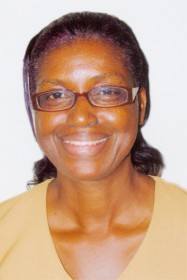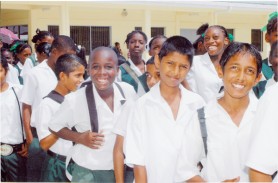Issues and challenges in the new academic year
In this issue the Guyana Review publishes a collection of articles that address themes and issues in the development of the education system. Some of the published articles were contributed by the Ministry of Education

As the Nation prepares for the new academic year 2009-2010, the Ministry of Education will implement a Transitional Six (6) Year Curriculum for underachieving Post Primary Students. Traditionally, Secondary Education meant five (5) years of Secondary School ie Grade 7-9, with the possibility of going on to 6th Form. At the end of these five years, students write the Caribbean Secondary Educa-tion Certificate (CSEC) Examinations and Guyana has had glowing successes as year after year Guyanese students gained the top awards in the Carib-bean. What continues to challenge the Education Sector however, is the fact that a significant number of students are academically unable to access the Secondary Curriculum and after five (5) years of Secondary Education fail to pass five (5) subjects at one (1) sitting, inclusive of English “A” and Mathematics at Grades 1-3, at the CSEC Examinations. In addition, many students without adequate Reading skills ultimately drop out of school and live out their lives unemployed or underemployed.
When one examines the competences of the pupils at the lower end of the continuum after the Grade Six Assessment it is easy to figure out that if some pupils were academically far behind their more able classmates, they will need a lot of “extra” instruction if they ever hope to catch up. The Transitional Six (6) Year Curriculum aims at doing just that- providing less able students with one extra academic year in Secondary School. This additional time comes at the beginning of the Secondary Cycle.
Multiple Intelligences, Relevance, and Active Learning
Stigler and Hiebert (1999) opined that “improving something as complex and culturally embedded as teaching, requires the efforts of all players, including students, parents and politicians. But the teachers must be the primary driving force behind change. They are the best positioned to understand the problems that face students and to generate possible solutions. In fact almost all successful attempts to improve teaching have included teachers working together to improve student learning” to this end the Ministry of Education has held consultations with Teachers of both Primary and Secondary Schools. It is now widely agreed that effective instruction is an underachieving student’s best hope for success in school.

The Transitional Six (6) Year Curriculum therefore focuses on the Multiple Intelligences of students, Relevance and Active Learning. Educators worldwide agree that some students learn Mathematics best with manipulatives, given their need to be active and use hands on materials. Others may prefer individual to group assignments. In addition, all students bring unique aspects of linguistic diversity that will best grow when encouraged and celebrated in classrooms. Another key to student’s motivation to learn lies in the teacher’s ability to connect the lesson content to the student’s everyday life. The methodology which will be used to deliver the Transitional Six (6) Year Curriculum will be more students centred, highly interactive and more participatory and integrated.
Subjects and Time Tabling for The
Transitional Six (6) Year Curriculum
This Transitional Six (6) Year Curriculum focuses on the basic concept skills and experiences Mathematics – Notation, Numeration, Tables, Calculations, Problem Solving.
English – Which includes the tenets of English B ie. Music, Drama, Story Telling and Poetry.
Science – Skills of Observation, Recording, Reporting, Measurement and Manipulation and development of the enquiry approach.
Social Studies – Life Skills, Citizenship, Family Life Education, Map Work, Art.
Reading – Phonemic awareness, listening speaking, writing, phonics, fluency, comprehension, vocabulary, spelling, dictation.
Physical Education – Sports, Dance, Games.
Study Skills.
Subjects for the Transitional Curriculum
► English A which includes the tenets of English B i.e.
Dance, Music, Drama, Story Telling.
► Mathematics (Notation, Tables, Calculations,
Problem Solving)
► Science (Skills of Observation, Recording,
Reporting, Measurement and Manipulation.
Development of the enquiry approach.)
► Social Studies (Life Skills, Citizenship, Family Life
education)
► Reading (Phonetic awareness, listening, speaking
and writing)
► Physical Education (Sports and Games)
This Curriculum ensures that seventy five percent (75%) of the time will be allocated to Literacy, thus ensuring that students are literate and numerate. At the end of this Transitional Year, students would have bridged the gaps in their knowledge from Grades 1-6, thereby ensuring that all Post Primary Students can access the Secondary Curriculum.
Implementation Plan
In order to effectively roll out this Transitional Six (6) Year Curriculum, the Ministry of Education is preparing Transitional Six (6) Year Curriculum Guides and activity Booklets for Mathematics, English, Science, Social Studies and Reading. Teachers in Regions 1, 3, 4, 5 and Georgetown have already been sensitized and training workshops have started. These workshops will prepare teachers to use the best methodologies in delivering the Transitional Curriculum.
The Secondary Departments of All Age Schools are being amalgamated to allow for adequate staffing to effect the delivery of the Transitional Six (6) Year Curriculum while efforts are being made to rehire trained and experienced teachers to staff these schools where necessary.
The focus on standards accountability and assessment to meet the individual needs of students will encourage steady increased achievement thus ensuring that no child is left behind.




